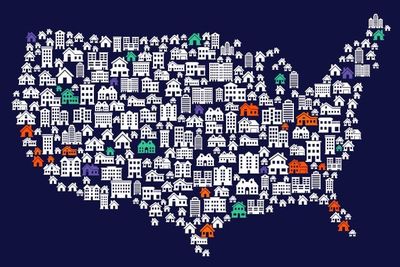NASHVILLE, Tenn. (July 27, 2020) - A new report from real estate investing platform Roofstock.com finds that the Nashville-Davidson, Murfreesboro and Franklin area is among the 10th fastest growing metros in the United States.
COVID-19 has radically changed the norms of the American workforce. Unprecedented job losses, shuttered business and stay at home orders have affected workers across all industries and job functions. One of the most notable changes during COVID-19 has been the adoption of remote work, a trend that will undoubtedly impact the future of many American cities.
According to data collected from the Federal Reserve in April of 2020, more than half of all workers were performing at least some of their work from home, and 41 percent were completing all of their work at home. These figures stand in stark contrast to those collected in October of 2019, which indicated that only 7 percent of non-self-employed workers usually worked from home.
“This mass transition to remote work in the wake of coronavirus is reinforcing a trend that has been gaining momentum in recent years, namely, many people fleeing expensive cities in favor of more affordable locations,” a website spokesperson said in an email about the study. “Now, with many companies, including tech giants like Twitter and Facebook, announcing that they will allow employees to work from home permanently, the migration trend toward more affordable locations is likely to accelerate.”
The study sought out to identify locations that are likely to continue attracting new residents. To find the most affordable places in the U.S. that people have already been moving to in recent years, its researchers analyzed population statistics from the U.S. Census Bureau and cost-of-living data from the U.S. Bureau of Economic Analysis. Looking only at locations where cost of living does not exceed the national average by more than 3 percent, Roofstock identified the cities and states with the largest population increases between 2015 and 2018.
The most affordable and fast-growing states are located in the South and the West. Between 2015 and 2018, nine states in the South and West experienced population growth more than twice the national average of 1.79 percent. In fact, four states experienced population growth greater than 5 percent—Idaho, Utah, Florida, and Arizona over the same time period. Likewise, metropolitan areas in the South and West offer lower living costs, and have been attracting large numbers of movers in recent years.
Metropolitan areas were grouped into the following cohorts by population size: large metros (more than 1,000,000), midsize metros (350,000-999,999), and small metros (100,000-349,999).
The analysis found that between 2015 and 2018, Nashville experienced a net population change of 101,801 residents, according to the website. With an increase of 5.56%, Nashville has experienced the 10th largest net population growth among affordable large metropolitan areas in the U.S. Here is a summary of the data:
- 3-year net population growth (percent): 5.56%
- 3-year net population growth (total): 101,801
- Cost of living (compared to national average): -5.1%
- Median home price: $287,200
- Average 2-bedroom rent: $1,136 per month
For reference, here are the statistics for the entire United States:
- 3-year net population growth (percent): 1.79%
- 3-year net population growth (total): 5,748,618
- Cost of living (compared to national average): N/A
- Median home price: $251,598
- Average 2-bedroom rent: $1,204 per month
Nashville Post reported earlier this month that Nashville saw a June home sales increase of .5% and the market has been stabilizing after May’s COVID-fueled plummet of 22%. Specifically, there were 4,191 residential property closings for the month, up from the 4,172 closings in June 2019. Additionally, 4,648 sales were pending at the end of June, up from the 3,645 pending deals for the same month last year.
